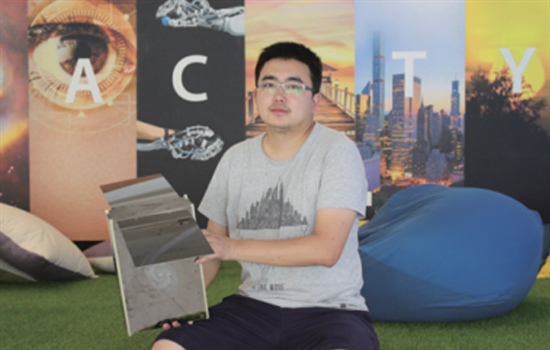
Yang Feng with a microsatellite developed by his company in Changsha, Hunan province.(Photo provided to China Daily)
The microsatellite market, worth $30 billion, accounts for 10 percent of the whole industry
While most people consider space technology to be a serious scientific topic, Yang Feng describes it as "something sexy".
In the office of his satellite company, walls are decorated with NASA posters, because he feels they help create a "sexy atmosphere".
He had a company T-shirt made with two sentences printed on the back: "World's Greatest Aerospace Engineer. Yes, I am a scientist."
"When I wear it in public, it gets a lot of attention," he said.
The 34-year-old is the CEO of Spacety Aerospace Co, which develops microsatellites for scientific experiments and technology validation, in Changsha, capital of Hunan province.
Said to be the country's first privately funded satellite company, Yang's firm is unusual for China, where almost all satellites are developed by large State-owned corporations and all the launching sites are State-owned.
In the space industry, private companies are more heavily involved in the satellite applications fields of telecommunications, remote sensing and navigation, but not satellite building.
"Many people think satellites must be big, heavy constructions, but in fact, microsatellites can achieve what big satellites do at a lower cost," said Yang, who used to work for a State-owned organization.
In addition, using microsatellites for scientific experiments and technology validation is a market worth $30 billion, or 10 percent of the global satellite applications market, he said.
"Last year, the government adopted favorable policies for private capital to enter the space industry and encouraged scientific researchers to start businesses. I read success stories of private space companies abroad, such as SpaceX, Skybox and Planet Labs, and I believed it could also work in China," he said.
Yang quit his job last year and brought together a group of people, with an average age younger than 30, who boasted similar career backgrounds and had shared goals.
"Elon Musk is an idol for us. It's his story that led me and my colleagues to pursue the commercialization of satellite applications, but we don't compare ourselves to him, because what we've achieved, so far, is not comparable to his achievements," he said.
But what his group has done has already exceeded many people's expectations.
After recently securing investment of more than 10 million yuan ($1.5 million), his company will see two satellites launched before the end of the year.
One of them is to help researchers conduct scientific experiments in microgravity. The satellite was jointly developed by Yang's company and its European partners, and will be launched in Europe.
The other, a self-developed CubeSat-a type of miniaturized satellite for space research-is scheduled to be blasted off at Jiuquan Satellite Launch Center in the Gobi Desert in November and will test some key technologies developed by the company.
"If successful, our satellites could be more cost-effective and will allow scientists, engineers and public users to access and control satellites more conveniently," he said.
Yang's company plans to launch three more satellites next year, one of which is an astronomical satellite.
The idea emerged after Yang heard one of his friends, an amateur stargazer, spent more than 100,000 yuan last year on a survey telescope in the Xinjiang Uygur autonomous region to better see the stars.
"The money he is willing to spend on stargazing shocked me. It came to me that we could launch a satellite-named Mini Hubble-equipped with an optical astronomical telescope and connect it to the web, so stargazers around the world can access it via the internet and take photos with it," he said.
"The benefits of working for yourself, instead of within the State system, are that you can pursue your own innovative ideas and hopefully see some returns," he said.


















































